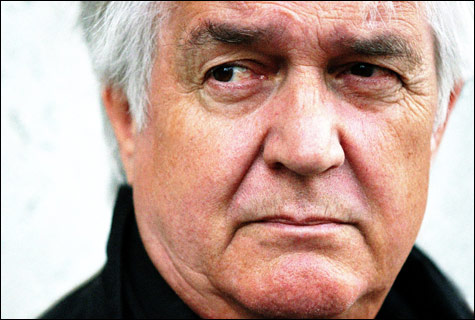
MORAL IMPERATIVE: The author of the best-selling Wallander crime novels here obscures his usual deft characterizations with didacticism. |
| The Man from Beijing | by Henning Mankell | translated from the Swedish by Laurie Thompson | Knopf | 384 pages | $25.95 |
A lone wolf lopes across a border, searching for food. The creature, which has passed from Norway to Sweden, is starving and will eat anything. That he finds a human body is almost incidental, but it makes the perfect moody opening for Henning Mankell’s latest, The Man from Beijing.That body is one of 19, all murdered in a remote village. The wolf is long gone by the time humans discover the crime. When they do, the mass murder kicks off a global manhunt. But for the reader, in typical Mankell fashion, solving the crime will not be as important as discovering why it was committed.
Perhaps that’s why in this stand-alone, Mankell — best known for his Kurt Wallander mysteries — chooses not to make a police detective his protagonist. Instead, he opts for a judge, Birgitta Roslin. On leave from her job for health reasons, Roslin develops an interest in the murders once she discovers that her mother’s foster parents were victims. Among their papers, she uncovers a diary that links her family, via a 19th-century emigrant, to a Chinese family. That tie kicks off three parallel stories: the chronicle of Roslin’s informal investigation; the sad saga of San, a Chinese laborer transported to America in 1863; and the rise of Ya Ru, a present-day Beijing capitalist. These stories form a chain of connection and culpability that spans four continents, linking European and American colonialism with China’s current goals and the attendant human-rights abuses.
Mankell has long stressed the evils of globalization as a subtext to his mysteries. In such Wallander books as The Dogs of Riga and Sidetracked, he has shown how faceless economic immigrants can be victimized, and how, whereas trade crosses borders easily, justice is a less portable commodity. That he attempts to go one step farther here is commendable. But in doing so, the Swedish bestseller makes a rare misstep. Mankell’s work, like all the best crime fiction, is highly moral. In his other books, however, he has given us skillfully drawn characters. What they find and how they are changed is what has led his readers to their conclusions.
That is not the case with The Man from Beijing. Too often, a kind of self-righteous didacticism sets in. At one point, a scholar delivers a speech on Chinese history over the course of 12 pages and then disappears. Such digressions — especially after those evocative opening two pages about a wolf in the wilderness — signal a kind of impatience, as if the author were so eager to get to his themes, he couldn’t let them unfold naturally.
It’s a pity, because Mankell has not lost his gift for personalization. Twice in this sprawling book, he creates the kind of flawed but sympathetic individuals he’s become known for. Roslin and Hong Qui — Ya Ru’s sister — share a commitment to the moral ideals of their homelands. And Mankell shows their struggles through distinct and vivid interior monologues. “She liked working late at night,” Roslin acknowledges early on. “There were echoes in the walls, whispering voices still living on after all the drama of past trials.”